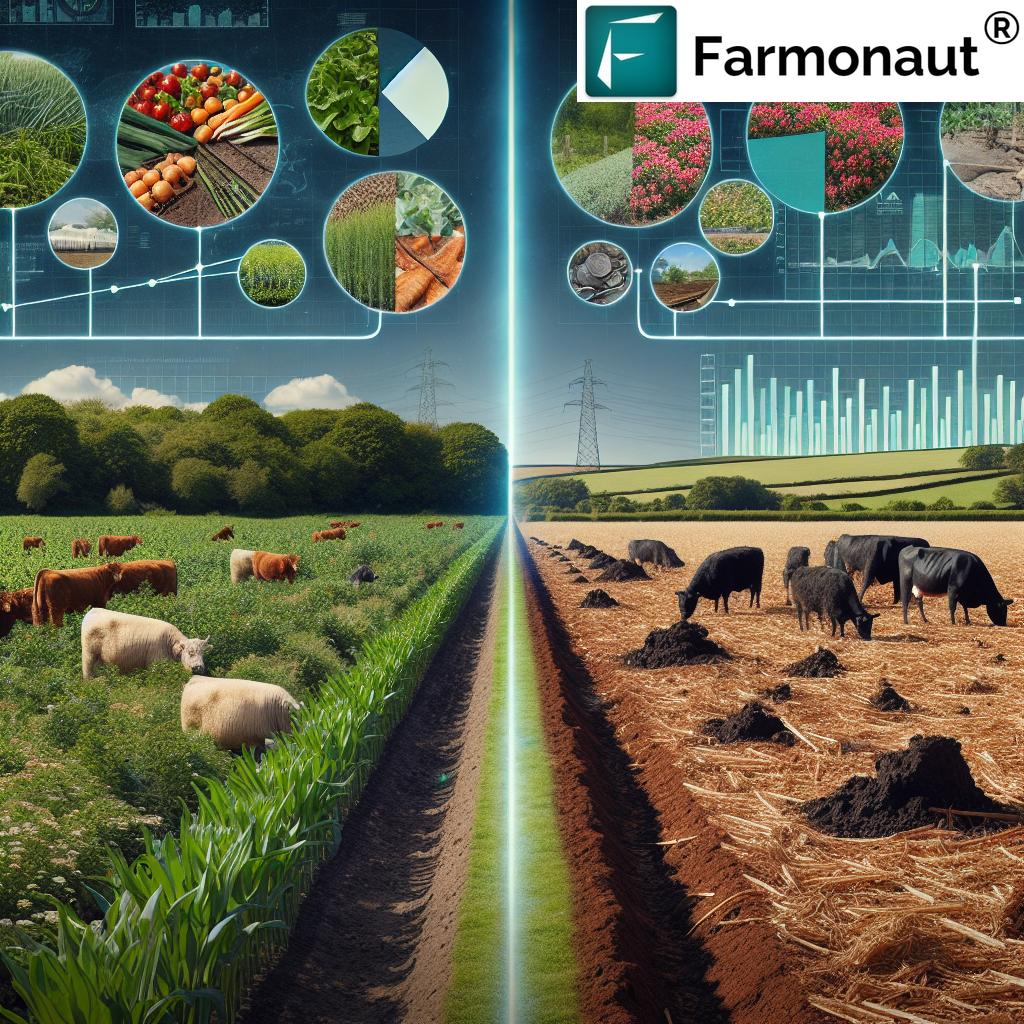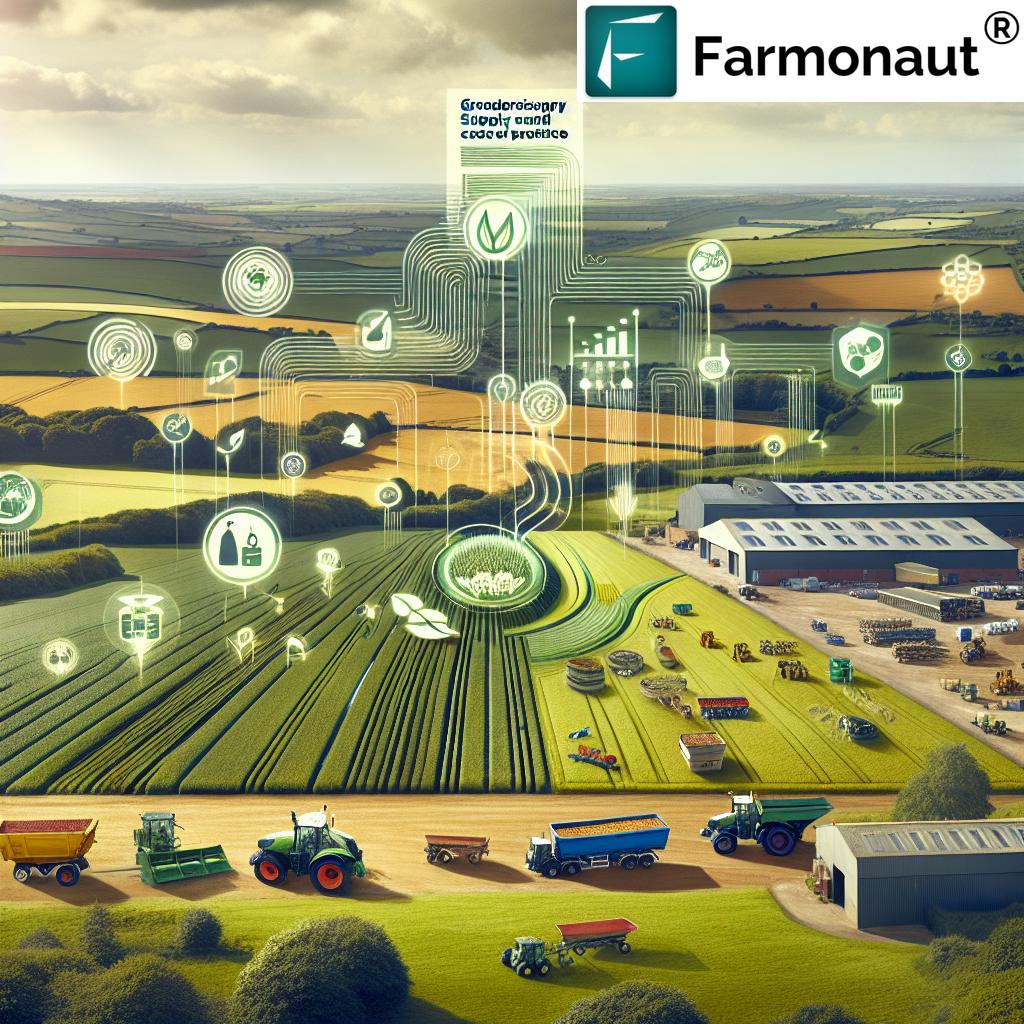Breaking News: UK Grocery Code Breaches Expose Need for Fair Supplier Relationships and Sustainable Agriculture Practices

“UK investigation uncovers serious breaches in Groceries Supply Code of Practice, impacting thousands of farmers and suppliers.”
In a groundbreaking development that has sent shockwaves through the British agricultural sector, a recent investigation has uncovered serious breaches of the Groceries Supply Code of Practice. This revelation has far-reaching implications for farmers, rural life, and the entire UK agriculture industry. As we delve into the details of this report, we’ll explore how these findings highlight the urgent need for fair supplier relationships and sustainable agriculture practices.
The Investigation: Unveiling Unethical Practices
The investigation, conducted by the Groceries Code Adjudicator, has brought to light a series of unethical farming practices and unfair supplier relationships within the grocery supply chain. These breaches not only undermine the principles of fair trade but also pose significant challenges to the sustainability of British agriculture.
- Delayed payments to suppliers
- Unfair pricing practices
- Unilateral changes to supply agreements
- Excessive quality control measures
These practices have put immense pressure on farmers and suppliers, particularly those managing arable land, dairy farms, and poultry operations. The impact extends beyond individual farms, affecting entire rural communities and the broader agricultural ecosystem.
Agricultural Supply Chain Management: A Critical Focus
The report emphasizes the importance of robust agricultural supply chain management in ensuring fair practices and sustainable operations. As we navigate these challenges, it’s crucial to consider innovative solutions that can address the root causes of these issues.
Explore Farmonaut’s cutting-edge solutions: 
The Role of Agritech in Promoting Fair Practices
In light of these developments, the need for agritech solutions for farmers has never been more apparent. Technologies that enhance transparency, improve efficiency, and promote sustainable farming practices can play a pivotal role in creating a more equitable agricultural landscape.
- Satellite-based crop monitoring
- AI-driven farm management systems
- Blockchain for supply chain transparency
- Precision agriculture tools
These technologies not only help optimize crop yields but also provide farmers with the data and insights needed to negotiate fair terms with buyers and uphold ethical farming practices.

Sustainable Agriculture Practices: A Path Forward
“Sustainable agriculture practices could potentially increase crop yields by 20-30% while ensuring fair treatment of suppliers.”
The investigation’s findings underscore the critical need for adopting sustainable agriculture practices across the UK. These practices not only promote environmental stewardship but also contribute to the long-term viability of farms and the fair treatment of suppliers.
- Crop rotation and diversification
- Integrated pest management
- Water conservation techniques
- Soil health management
By implementing these practices, farmers can improve their resilience to market pressures and environmental challenges while maintaining ethical standards in their operations.
UK Agriculture Industry Trends: Adapting to Change
The revelations from this investigation are likely to accelerate several trends within the UK agriculture industry:
- Increased adoption of agritech solutions
- Greater emphasis on supply chain transparency
- Shift towards more sustainable farming methods
- Growing interest in direct-to-consumer models
- Enhanced focus on rural development and support
These trends present both challenges and opportunities for British farmers, particularly those involved in cereals, cattle, sheep, and pig farming. Adapting to these changes will be crucial for the long-term success of individual farms and the industry as a whole.
Harness the power of satellite technology: Farmonaut Satellite API
Farm Equipment and Machinery: Driving Positive Change
As the industry grapples with these challenges, innovative farm equipment and machinery will play a crucial role in driving positive change. From precision irrigation systems to advanced harvesting equipment, these technologies can help farmers:
- Improve resource efficiency
- Reduce environmental impact
- Enhance product quality
- Increase operational transparency
By investing in these cutting-edge tools, farmers can not only optimize their operations but also strengthen their position in negotiations with buyers.
The Impact on Rural Life and British Agriculture
The breaches uncovered in this investigation have far-reaching consequences for rural life in Britain. From small family farms to large agricultural enterprises, the effects are being felt across the sector:
- Financial strain on farming communities
- Challenges to rural employment
- Pressure on local agricultural services
- Potential shifts in land use and farming practices
Addressing these issues will require a concerted effort from policymakers, industry leaders, and farmers themselves to create a more resilient and equitable agricultural sector.
Stay updated with Farmonaut’s mobile apps:


Crop Yield Optimization: A Key to Fair Relationships
One of the most effective ways to strengthen farmers’ positions in the supply chain is through crop yield optimization. By maximizing productivity and quality, farmers can:
- Increase their bargaining power
- Reduce dependency on single buyers
- Improve financial stability
- Invest in sustainable practices
Advanced technologies, such as those offered by Farmonaut, can provide farmers with the insights and tools needed to achieve these goals.
Government and Policy Implications
The findings of this investigation are likely to have significant implications for government policy and agricultural law. We may see:
- Stricter enforcement of the Groceries Supply Code of Practice
- New legislation to protect farmers and suppliers
- Increased support for sustainable farming initiatives
- Enhanced monitoring of supply chain practices
Farmers and industry stakeholders should stay informed about these potential changes and be prepared to adapt their operations accordingly.
Access detailed developer documentation: Farmonaut API Developer Docs
Sustainable Farming Technologies: A Closer Look
As we move towards more ethical and sustainable agricultural practices, several key technologies are emerging as game-changers:
- Precision Agriculture: Using GPS, sensors, and data analytics to optimize resource use.
- Vertical Farming: Maximizing yield in limited spaces while reducing water and pesticide use.
- Regenerative Agriculture: Focusing on soil health and biodiversity to improve long-term productivity.
- Smart Irrigation: Using AI and IoT devices to optimize water usage based on real-time conditions.
- Blockchain for Traceability: Ensuring transparency and accountability throughout the supply chain.
These technologies not only support ethical farming practices but also contribute to the overall sustainability and resilience of the agricultural sector.
The Role of Renewable Energy in Agriculture
As the UK agriculture industry faces these challenges, the adoption of renewable energy sources presents an opportunity for farmers to reduce costs and improve sustainability. Key areas of focus include:
- Solar panels on farm buildings
- Wind turbines on agricultural land
- Biogas production from agricultural waste
- Energy-efficient farm equipment
By investing in renewable energy, farmers can not only reduce their environmental impact but also create additional revenue streams, enhancing their financial resilience in the face of market pressures.
Animal Health and Welfare: A Critical Consideration
The investigation’s findings also highlight the need for increased attention to animal health and welfare in the context of fair supplier relationships. Key areas of focus include:
- Improved housing and living conditions for livestock
- Advanced health monitoring systems
- Ethical breeding practices
- Sustainable feed and forage management
By prioritizing animal health and welfare, farmers can not only meet ethical standards but also improve the quality and value of their products, strengthening their position in negotiations with buyers.
Diversification: A Strategy for Resilience
In light of the challenges exposed by the investigation, farm diversification emerges as a crucial strategy for building resilience. Opportunities for diversification include:
- Agritourism initiatives
- Value-added product development
- On-farm renewable energy production
- Specialty crop cultivation
By diversifying their income streams, farmers can reduce their dependency on single buyers and create more stable, sustainable businesses.
The Future of British Agriculture: Embracing Change
As we move forward from this watershed moment in British agriculture, it’s clear that embracing change and innovation will be key to creating a more equitable and sustainable future for the industry. This includes:
- Adopting advanced farm management technologies
- Fostering closer collaborations between farmers and technology providers
- Developing new skills and knowledge in sustainable farming practices
- Engaging in proactive dialogue with policymakers and industry leaders
By taking these steps, British farmers can not only overcome the challenges revealed by this investigation but also position themselves at the forefront of a more ethical and sustainable global agricultural industry.
Farmonaut: Empowering Farmers in Changing Times
As the agriculture industry navigates these challenges, Farmonaut’s innovative solutions can play a crucial role in empowering farmers. Our satellite-based farm management platform offers:
- Real-time crop health monitoring
- AI-driven advisory systems
- Resource management tools
- Blockchain-based traceability solutions
These tools can help farmers optimize their operations, improve transparency, and strengthen their position in the supply chain.
Frequently Asked Questions
Q: What were the main breaches uncovered in the UK Grocery Code investigation?
A: The investigation revealed several breaches, including delayed payments to suppliers, unfair pricing practices, unilateral changes to supply agreements, and excessive quality control measures.
Q: How can sustainable agriculture practices benefit farmers in light of these findings?
A: Sustainable practices can increase crop yields, improve resource efficiency, enhance product quality, and strengthen farmers’ negotiating positions with buyers.
Q: What role can agritech solutions play in addressing these challenges?
A: Agritech solutions can provide farmers with data-driven insights, improve operational efficiency, enhance transparency, and support the implementation of sustainable farming practices.
Q: How might these findings impact rural life in Britain?
A: The breaches could lead to financial strain on farming communities, challenges to rural employment, pressure on local agricultural services, and potential shifts in land use and farming practices.
Q: What policy changes might we see in response to this investigation?
A: We may see stricter enforcement of the Groceries Supply Code of Practice, new legislation to protect farmers and suppliers, increased support for sustainable farming initiatives, and enhanced monitoring of supply chain practices.
Conclusion: A Call for Change
The recent investigation into breaches of the UK Groceries Supply Code of Practice has exposed significant challenges facing the British agricultural sector. However, it also presents an opportunity for positive change. By embracing sustainable agriculture practices, leveraging innovative technologies, and fostering fair supplier relationships, we can create a more resilient, ethical, and prosperous future for UK agriculture.
As we move forward, it’s crucial for all stakeholders – from farmers and suppliers to policymakers and technology providers – to work together in addressing these challenges. By doing so, we can ensure that British agriculture not only survives but thrives in the face of changing market dynamics and environmental pressures.
At Farmonaut, we remain committed to supporting farmers and the agricultural industry through these transitions. Our advanced satellite-based solutions and AI-driven insights are designed to empower farmers, promote sustainability, and foster fair practices across the supply chain. Together, we can build a stronger, more equitable future for British agriculture.
| Code Breach | Impact on Suppliers/Farmers | Sustainable Agriculture Solutions |
|---|---|---|
| Delayed payments | Cash flow issues, financial instability | Blockchain-based payment systems for transparency |
| Unfair pricing practices | Reduced profitability, unsustainable operations | Data-driven price negotiations using market insights |
| Unilateral changes to agreements | Uncertainty, inability to plan effectively | Smart contracts for secure, transparent agreements |
| Excessive quality control measures | Increased food waste, financial losses | Precision agriculture using satellite imaging for quality assurance |
| Unreasonable last-minute order changes | Operational disruptions, resource wastage | AI-driven demand forecasting and inventory management |
By addressing these issues and implementing sustainable solutions, we can create a more equitable and resilient agricultural sector in the UK. The path forward requires collaboration, innovation, and a commitment to ethical practices at every level of the supply chain.



